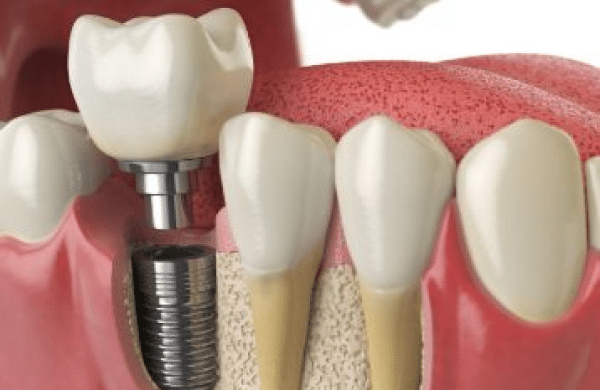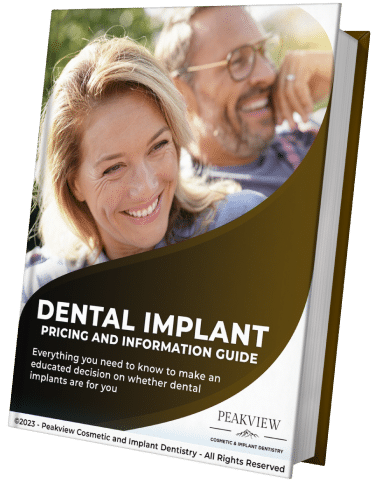
They are actually very rare. At PeakView Cosmetic and Implant Dentistry one of the reasons that we recommend dental implants is due to their high success rate. Depending on the dentist you visit, the success rate can be as high as 99 percent.
If there is a problem, your dental implant can become loose or the crown (tooth portion) could crack or fall off. If a problem does occur, we will be able to repair the damage and fix the situation in an efficient manner.


If your implant has become loose, it may be due to the fact that osseointegration never took place. Osseointegration is the process where the titanium implant fuses with the actual jawbone. The body deposits bone around the implant over the course of several months and secures the implant in the same way it secures the natural root of a tooth. If that process does not fully complete, your implant could become loose in the future. Additionally, the stability of your implant depends on your jawbone remaining dense and strong. If you develop gum disease or an infection that deteriorates your bone, the implant could become loose and fail. This makes it important to call our dental office if you notice any signs of gum disease which may include red, swollen and bleeding gums. Additionally, if you develop a toothache, visit our office for treatment right away. Doing so will prevent you from developing an infection that could negatively impact your jawbone.
Call us right away. The implant will not tighten on its own, nor will the problem correct itself. If you attempt to self-diagnose and treat, you can end up damaging your bone.



That depends on which portion of the implant we need to repair. If the actual tooth (dental crown) is cracked or damaged, we can replace it without needing to address the actual implant (titanium post). If your tooth falls out, bring it with you. Otherwise, we can examine it and let you know if we can repair the crack or chip without actually removing the crown. At PeakView Cosmetic and Implant Dentistry, we view this as the best-case scenario since it is the fastest way to restore your implant and the least invasive. If the crown needs replacement, the dental lab will create a new one for us to carefully attach to the abutment on your implant.
If your actual implant fails, then that is a whole new process that can take up to four steps. The first step is to carefully remove it, which may require surgery. Then depending on the condition of your jawbone, a bone graft may be necessary. If your implant became loose due to a lack of density, not correcting the problem will make it impossible to replace the implant. You will need to heal from this procedure before we can place a new implant; essentially starting the procedure all over again. If you face this scenario, we can discuss the various options that are available to you in further detail.

If the tooth portion of your implant has fractured, we will examine you and let you know if we can restore it using bonding material. If we cannot, then we will have to replace the crown.
Yes, if the actual implant becomes loose, we will typically need to remove it. We will then need to clean the area and complete a bone graft if necessary. We can place a new implant after the healing process.
Implant failure requires surgical intervention to remove, clean, and graft the jawbone. The procedure is done under anesthesia. Recovery is similar to initial implant placement, with swelling, discomfort, and soreness. Use ice packs, take ibuprofen, and eat cool soft foods. Avoid pressure on the area if a bone graft was done. Follow dietary restrictions. After a follow-up, resume normal diet. A bone graft may take 6-9 months before a new implant can be placed, following the initial process.
Probably not. Dental implants have a success rate of 99 percent. It is incredibly rare for a dental implant to fail so if one does, your others should be fine. The only difference is that if you had an injury that caused an implant to fail, you should have all of your teeth examined to make sure that none of the rest are damaged.
We can conduct an initial examination, identify what the problem is and how extensive it is. This will involve a physical examination along with X-rays so that we can determine the density of your jawbone. At that point, we will let you know if we can assist you or if you need to be referred to a specialist. At PeakView Cosmetic & Implant Dentistry our focus is on your complete oral health and ensuring that you have access to the procedures you need.
If the tooth portion of your implant has fractured, we will examine you and let you know if we can restore it using bonding material. If we cannot, then we will have to replace the crown.
Discover the passion and commitment that drives our dental team

Dr. Adam Kwiatkowski, a graduate of the University of Illinois at Chicago College of Dentistry, has received multiple awards for his outstanding achievements in cosmetic and implant dentistry. He is a recipient of the International Congress of Oral Implantologists’ Pre-doctoral Student Achievement Award and a member of the Omicron Kappa Upsilon National Dental Honor Society.

Dr. Hearne, originally from Las Vegas, was inspired to become a dentist at the age of 12 by a close family friend who was a renowned dentist. With a foundation in customer service and excellence from his early career in the hotel industry, Dr. Hearne was further inspired to become a compassionate caregiver for his patients after the passing of his younger brother to cystic fibrosis at the age of 7.

I was born in Ogden, Utah and always knew I wanted to pursue a career in healthcare. After serving an LDS mission in South Africa and getting married, I studied biology at Weber State University and attended the prestigious Creighton University School of Dentistry in Omaha, Nebraska. There, I received multiple awards for clinical excellence before settling down in St. George with my family.

Tuesdays by appointment only